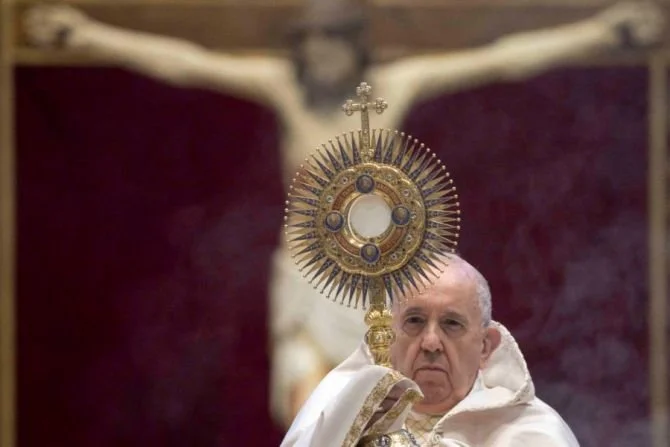“If you are the same at the end of the Mass, as you were at the beginning, something is wrong.” These are the words of Pope Francis in a recent appeal to the Roman Catholic faithful to place the celebration of the Eucharist at the center of their lives.
Read MoreAccording to Rome, regeneration occurs the moment the sacrament of baptism is administered. This is the entry-point to the sacramental life and economy of the Roman Catholic Church. This, however, is problematic from an evangelical perspective.
Read MoreEvangelicals need to be aware of what is taking place so that they are equipped to understand the implications of synodality. The following reflections are by no means exhaustive, but simply provide food for thought for the evangelical church as the synodal process continues.
Read MoreThe Evangelical church ought to take note of this and understand what is at stake with statements such as the Declaration on Human Fraternity. It is not an anomaly, but consistently reflects Vatican II. Peace and fraternity are admirable endeavors, but not at the expense of the Gospel of Jesus Christ.
Read MoreWhile certain aspirations of the Synodal Path being proposed by Pope Francis seem admirable, it presents several concerns for the evangelical church. Let us briefly consider two.
Read MoreWhile Jews and Muslims and Christians are called to live in peace, to respect one another, to dialogue, and to collaborate together on issues that do not require a capitulation of any kind whatsoever of the gospel, the Bible is crystal clear that they are not brothers and sisters in the way that Pope Francis suggests. To say otherwise confuses and distorts the gospel to a point of unrecognition. And if the gospel is no longer recognizable, it can no longer save.
Read More“You may well ask: how do we win in life?” The answer to this question is not a sports analogy that encourages us to pursue our dreams while Jesus comes alongside and cheers us on as our coach. The answer to how we win in life is found in the redemptive work of Jesus Christ on the cross, where he claimed victory over death.
Read MoreIn Roman Catholicism there is an overly optimistic understanding of human nature after the fall. This is underscored by the complete absence of sin in Pacem in terris. However, an appeal for world peace that does not acknowledge sin (i.e. the Augustinian reading) will inevitably fall short of its objective.
Read MoreBefore it was the German "synodal path" that called for "no one to be excluded." Now it is the European base asking for the same. How will the Catholic Church respond?
Read MoreWhile the FdM is definitely an ambitious, well-organized and admirable initiative, it is also true that it is not clear what the Catholic church has in mind when it talks about mission.
Read More“A personal relationship with Christ.” Both the Evangelical church and the Roman Catholic Church speak of this, but the theological worlds they represent are very different and the implications are significant.
Read MoreAccording to Francis friendship and dialogue are more important than ever. This is because “Sadly, on all sides we hear the cry of a wounded humanity and a broken earth.” For encouragement and examples in healing these wounds, Francis called attention to both The Buddah and Jesus Christ.
Read MoreIn February of this year the well-known American Catholic George Weigel wrote a short, thought-provoking article for First Things titled “Liquid Catholicism and the German Synodal Path.” And while my good friend and colleague Leonardo De Chirico has already contributed an excellent reflection on Weigel’s article, two additional reflections are perhaps merited.
Read MoreThe subject of dialogue in modern-day Roman Catholicism highlights with clarity the unresolved issues of the “Roman” and “Catholic” natures of the Church. On the one hand dialogue desires to be “Roman.” It is an essential tool for evangelization. Through it the Church leaves its places of comfort and it goes forth and proclaims the gospel and makes disciples of Christ. It recognizes the importance of defining the distinctives of the Christian faith. On the other hand, dialogue is very “Catholic.” It highlights the fraternity and brotherhood of all mankind. It celebrates its commonality and affirms that which is good in humanity and its various religious expressions. It avoids discussion of Jesus and sin and refers to god generically.
Read MoreLevering argues that the 20th century witnessed an “abuse of conscience,” meaning that Catholic moral theology “gave too expansive a place to conscience in the Christian moral life” (p. 1). This problem, according to Levering, was only worsened after the Second Vatican Council.
Read MoreThere is an analogous case to be made in regard to doctrine within the Roman Catholic Church. Doctrine in Roman Catholicism develops, or evolves, over time. It is organic and develops in order to better respond to the most current culture. In this sense it develops in order to “survive and reproduce itself.” The discussion to be had, however, is if that development in doctrine is micro or macro in nature. That is, is it still identifiable with its previous version, or has it changed entirely and become a different and new doctrine? The Roman Catholic Church will argue that it is the former, but at times we are faced with contrasts in Roman Catholicism that challenge that claim.
Read MoreBack in 2014 Francis warned against innovation in pastoral care that gives birth to relativism. This is a grave danger in that it hides Jesus and truth from man. That is indeed true, but it is difficult to see how what has transpired since 2014 in the Pope’s papacy has not promoted relativism. If we are all brothers and God’s love is the same for everyone regardless of their beliefs, and if all religions are to be valued for the truth they contain, what room is left for the exclusive truth claims of the gospel of Jesus Christ (Acts 4:12; John 14:6)?
Read MoreIn September of 2000, the ecumenical pendulum had been slowly swinging towards a vastly more inclusive ecumenism, pioneered largely by the Second Vatican Council. Dominus Iesus was a bucket of cold water on a fire that had been slowly growing in intensity. Declarations of the nature of those just cited were a clear effort to stop the swinging of the pendulum and encourage its reverse course. In other words, Dominus Iesus was an effort to preserve the sacramental system of the Catholic Church. Despite its best efforts, however, the declaration could not entirely avoid the swing of the pendulum that had become irreversible after the Second Vatican Council, and that would have enduring and significant implications on the sacramental nature of the Church, as we are soon to see.
Read MoreMissiologists have been debating the following scenario for centuries. A missionary finds him or herself in a foreign context with foreign religions and pagan practices. How does he/she present the gospel to the people, their culture, and their worldview? The answer depends on how foreign religions are viewed and understood. For a Roman Catholic response to this important question, Pope Pius XII's 1951 encyclical Evangelii Praecones is extremely insightful. While it predates the Second Vatican Council by more than a decade (1962-1965), it accurately represents traditional Thomist Roman Catholic theology concerning this matter.
Read MoreHow can one focus on what unites people of different faiths, while also insisting on the proclamation of salvation in Christ, the only Mediator between God and man? How can one seek out shared convictions, while not diminishing the Church's commitment to evangelization? These juxtapositions, when understood in the light of Scripture, are simply not compatible. This is a serious problem, and it is poor pastoral advice.
Read More




















